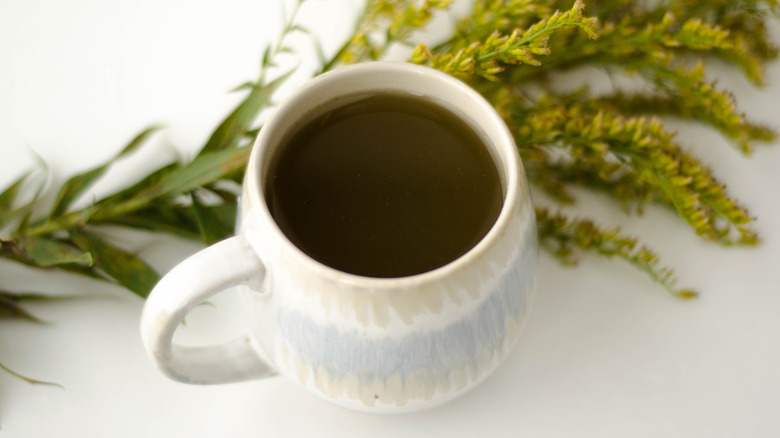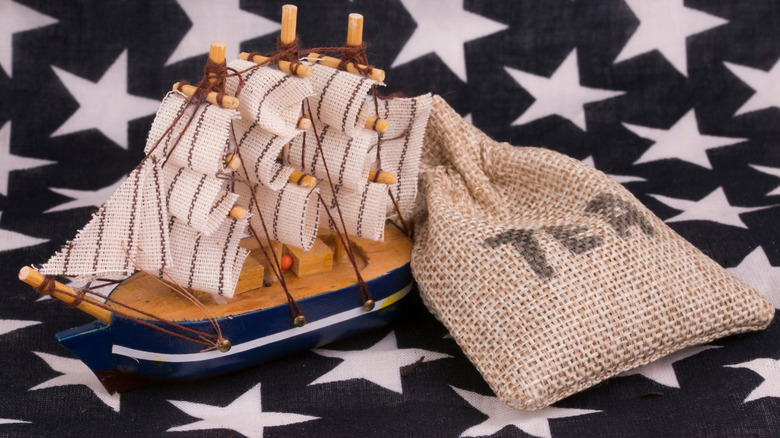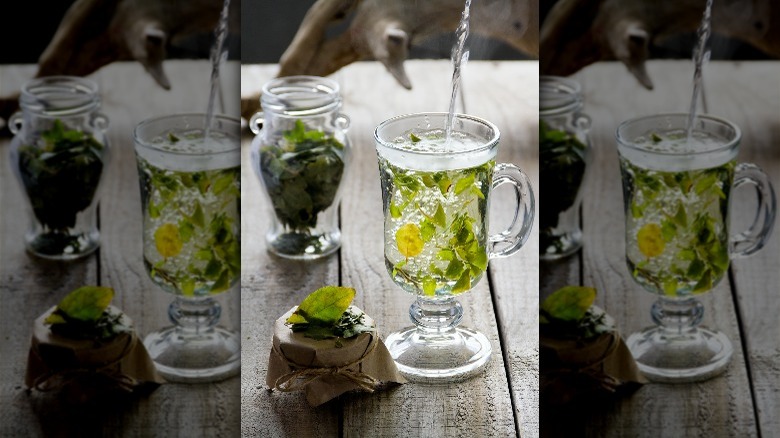Here's What Was In 'Liberty Tea', The American Revolution's Tea Substitute
The United States was once the land of Liberty Tea, a nickname for drinks that replaced English tea during the American War of Independence. The Founding Fathers had some surprising drinking habits and, following the Boston Tea Party, the rest of the colonists had to join in on getting creative with their beverages, too. Like chests of tea being tossed into a harbor, it's time to dive into a sea of tea history!
Britain was not always the tea aficionado it is now. According to the U.K. Tea & Infusions Association, tea originated in Imperial China. It wasn't until the early 1600s that Dutch and Portuguese traders brought the East Asian beverage westward to Europe. By the mid-17th century, Britain was starting to dabble in a spot of tea here and there. Yet, it was Catherine of Braganza, a Portuguese princess, who wed King Charles II and truly popularized the drink in merry old England, per the BBC. Even as early as 1689, though, the government began taxing its imports of tea (so steeply that people were smuggling in tea to turn a profit), so it's no surprise it did the same to its colonies a century later.
What led to the Boston Tea Party
As an extension of Great Britain, the American Colonies mirrored British culture in many ways, including its cuisine. According to The Metropolitan Museum of Art, tea culture was well established in the colonies by the middle of the 1600s, owing to European influences. A lot of American households at the time were stocked up with all sorts of tea supplies, like cream pots, dried-leaf canisters, hot-water urns, kettles, pots, sugar bowls, and trays. So, it would take a lot more than a revolution to stop the colonists' tea-drinking habits.
As a refresher for those who have forgotten their History lessons, in the 1760s, Britain found itself in debt, due in part to wars it had fought to protect its colonies. Naturally, the British government thought it could simply tax its colonists to raise money, but Americans balked at — say it with us now — taxation without representation. Instead, the colonies boycotted English tea and smuggled in Dutch tea. Then, when three British ships carrying tea docked at a Boston wharf, everything boiled over. A group of colonists snuck aboard those vessels and tossed a couple of hundred chests of tea into the ocean (something that you can still recreate today at the Boston Tea Party Ships & Museum). Massachusetts was severely punished by King George III, more tea parties occurred, and the 'shot heard 'round the world' reverberated globally a few months later.
Revolutionaries turned to local plants
If you're a tea drinker, you can imagine the predicament revolutionaries found themselves in. Nobody wants to pay exorbitant prices for tea, but boycotting your drink of choice is no simple task. So, according to the Boston Tea Party Ships & Museum, Americans turned to a variety of native flora. So-called "Liberty Teas" were made with a homegrown bounty of various herbs, flowers, fruits, mints, seeds, and tree barks. Funnily enough, America was even able to ship these Liberty Teas to England for sale! Meanwhile, Americans went around calling English tea poisonous, claiming that it gave people stomach aches or was used by insects for breeding. Folks even signed anti-tea pledges and petitions to ban English tea stateside.
Two of those replacements have been well remembered into the modern day, per State Symbols USA. In 1996, Delaware made its official state herb sweet goldenrod, a plant indigenous to Delaware's coasts, marshes, and thickets. During the war, its dried leaves and flowers were used to make a fragrant tea that tastes like anise or licorice. Later, in 1999, Maine made its herb wintergreen, a plant found in Maine's fields and forests. Now used in candy, gum, and toothpaste, wintergreen had previously been used by Native Americans to treat swelling and sore muscles, and for a time, it was used by revolutionaries to make Liberty Tea.
Give us libertea or give us ... ! Well, death might be a bit much, but Liberty Tea certainly sounds appetizing.


